Conjugation verb travel
Model : cancel
Auxiliary : have , be
Other forms: travel oneself / not travel
Contractions
in the U.K. spelling we double up the 'l' in preterite and participle endings
The verb has several variants of conjugation, which may correspond to different meanings. Please use the menu to select one or all variants.
- he/she/it travels
- they travel
- I travelled/traveled
- you travelled/traveled
- he/she/it travelled/traveled
- we travelled/traveled
- they travelled/traveled
Present continuous
- I am travelling/traveling
- you are travelling/traveling
- he/she/it is travelling/traveling
- we are travelling/traveling
- they are travelling/traveling
Present perfect
- I have travelled/traveled
- you have travelled/traveled
- he/she/it has travelled/traveled
- we have travelled/traveled
- they have travelled/traveled
- I will travel
- you will travel
- he/she/it will travel
- we will travel
- they will travel
Future perfect
- I will have travelled/traveled
- you will have travelled/traveled
- he/she/it will have travelled/traveled
- we will have travelled/traveled
- they will have travelled/traveled
Past continous
- I was travelling/traveling
- you were travelling/traveling
- he/she/it was travelling/traveling
- we were travelling/traveling
- they were travelling/traveling
Past perfect
- I had travelled/traveled
- you had travelled/traveled
- he/she/it had travelled/traveled
- we had travelled/traveled
- they had travelled/traveled
Future continuous
- I will be travelling/traveling
- you will be travelling/traveling
- he/she/it will be travelling/traveling
- we will be travelling/traveling
- they will be travelling/traveling
Present perfect continuous
- I have been travelling/traveling
- you have been travelling/traveling
- he/she/it has been travelling/traveling
- we have been travelling/traveling
- they have been travelling/traveling
Past perfect continuous
- I had been travelling/traveling
- you had been travelling/traveling
- he/she/it had been travelling/traveling
- we had been travelling/traveling
- they had been travelling/traveling
Future perfect continuous
- I will have been travelling/traveling
- you will have been travelling/traveling
- he/she/it will have been travelling/traveling
- we will have been travelling/traveling
- they will have been travelling/traveling
- let's travel
- travelling/traveling
- travelled/traveled

Perfect participle
- having travelled/traveled
Helping millions of people and large organizations communicate more efficiently and precisely in all languages.

Select your English level
To personalize your experience.
- To Travel Conjugation
In the US the spelling 'traveling' and 'traveled' are preferred.
Continuous Perfect
Conditional.
We notice you're using an ad blocker.
Linguasorb is free and ad supported, without ad revenue we can't exist. Certain features such as audio, directly cost us money and so are disabled for ad block users.
Please disable your ad blocker for this site if you wish to use the premium features.
Alternatively you can become a supporter and remove the ads completely .
Online Language Dictionaries
Perfect tenses, continuous (progressive) and emphatic tenses, compound continuous (progressive) tenses, conditional, subjunctive.
*Blue letters in conjugations are irregular forms. ( example ) *Red letters in conjugations are exceptions to the model. ( example )
Report a problem.
Conjugation English verb to travel
Simple present, present progressive/continuous, simple past, past progressive/continuous, present perfect simple, present perfect progressive/continuous, past perfect, past perfect progressive/continuous, future progressive/continuous, future perfect, future perfect continuous, conditional, progressive, perfect progressive, translation to travel.

'travel' conjugation table in English
Past participle, present participle, present continuous, present perfect, present perfect continuous, past continuous, past perfect, past perfect continuous, future continuous, future perfect, future perfect continuous.
Quick word challenge
Quiz Review
Score: 0 / 5
All ENGLISH words that begin with 'T'
Verb "travel"
For the settings to take effect, you must restart the trainer Restart
Conjugation
Simple tense.
Present Simple
- he, she travels
- they travel
Past Simple
- I traveled ; travelled
- you traveled ; travelled
- he, she traveled ; travelled
- we traveled ; travelled
- they traveled ; travelled
Future Simple
- I will travel
- you will travel
- he, she will travel
- we will travel
- they will travel
Continuous Tense
Present Simple Continuous
- I am traveling ; travelling
- you are traveling ; travelling
- he, she is traveling ; travelling
- we are traveling ; travelling
- they are traveling ; travelling
Past Simple Continuous
- I was traveling ; travelling
- you were traveling ; travelling
- he, she was traveling ; travelling
- we were traveling ; travelling
- they were traveling ; travelling
Future Simple Continuous
- I will be traveling ; travelling
- you will be traveling ; travelling
- he, she will be traveling ; travelling
- we will be traveling ; travelling
- they will be traveling ; travelling
Perfect Tense
Present Perfect
- I have traveled ; travelled
- you have traveled ; travelled
- he, she has traveled ; travelled
- we have traveled ; travelled
- they have traveled ; travelled
Past Perfect
- I had traveled ; travelled
- you had traveled ; travelled
- he, she had traveled ; travelled
- we had traveled ; travelled
- they had traveled ; travelled
Future Perfect
- I will have traveled ; travelled
- you will have traveled ; travelled
- he, she will have traveled ; travelled
- we will have traveled ; travelled
- they will have traveled ; travelled
Perfect Continuous Tense
Present Perfect Continuous
- I have been traveling ; travelling
- you have been traveling ; travelling
- he, she has been traveling ; travelling
- we have been traveling ; travelling
- they have been traveling ; travelling
Past Perfect Continuous
- I had been traveling ; travelling
- you had been traveling ; travelling
- he, she had been traveling ; travelling
- we had been traveling ; travelling
- they had been traveling ; travelling
Future Perfect Continuous
- I will have been traveling ; travelling
- you will have been traveling ; travelling
- he, she will have been traveling ; travelling
- we will have been traveling ; travelling
- they will have been traveling ; travelling
Conditional
- I would travel
- you would travel
- he, she would travel
- we would travel
- they would travel
- I would have traveled ; travelled
- you would have traveled ; travelled
- he, she would have traveled ; travelled
- we would have traveled ; travelled
- they would have traveled ; travelled
Present Continuous
- I would be traveling ; travelling
- you would be traveling ; travelling
- he, she would be traveling ; travelling
- we would be traveling ; travelling
- they would be traveling ; travelling
Perfect Continuous
- I would have been traveling ; travelling
- you would have been traveling ; travelling
- he, she would have been traveling ; travelling
- we would have been traveling ; travelling
- they would have been traveling ; travelling
- we Let's travel
Other verbs
Be the first to comment.
Add comment
- English Grammar
Irregular verbs
Level: beginner
Most verbs have a past tense and past participle with –ed :
work ed play ed listen ed
But many of the most frequent verbs are irregular:
Grouping_MTYxNjU=
Hello I do not know if this is the right session, but I would ask you about the verbs: "to lend" and "to borrow" Although "to lend" refers to giving something to someone, and "to borrow" to taking and using something from others, I struggle to put this concept into practice. For instance, now it is easy for me to remember: "Can you lend me your umbrella?" or "Can I borrow your umbrella?" If you ask me the difference in a few hours, I will not be sure which one is the correct form. Do you have any suggestions? Thanks for help.
- Log in or register to post comments
Hi User_1,
I would suggest that as part of your vocabulary learning, you try to use the words in meaningful conversations, writing or speaking. For example, try to use the words when you are writing your diary, talking to someone, or taking an English class. When you use the new words, it forces you to think about the words more, associate them with other words, and put them into a meaningful context. All of these things can be cues for your memory.
Also, difficulty may appear because you are learning "lend" and "borrow" at the same time, and their meanings are related. That means that their meanings can easily become confused in our memory. If this happens to you, I would suggest learning them one by one. Choose one to focus on first, and practise it. For example, if you focus on "lend", you can make some questions to ask to people (e.g. Can you lend me your phone? Can you lend me some money? ) and look for opportunities to really ask those questions. You could also write some example sentences (e.g. Banks lend money ) focusing on that word, look out for it when you are reading or listening, or search for "lend" in a dictionary and read the example sentences there. When the word feels comfortable and fixed in your vocabulary, move on to "borrow".
I can give you an example from my own experience. I'm trying to learn Korean, and I always mixed up the words "autumn" and "winter" because they sound similar to me. But then I listened to a podcast about winter in Korea, and they repeated the word "winter" a lot. When I made some notes after listening, I wrote "winter" many times. That helped fix the word "winter" in my mind, and then it was easier to remember "autumn" after then.
I hope that helps.
LearnEnglish team
Jonathan, your suggestion to learn the new words one by one and practise one at a time into a meaningful context is really helpful. Thanks for sharing your experience with Corean learning as well. Knowing your struggles while learning a foreign language is reassuring.
Hi User_1,
I'm glad it was helpful. I forgot to mention, to learn a word it also helps if you consider related words in the same word family. For example, related to "lend" are:
- lender (= a business or person that lends money)
- lent (= past form of lend)
You may be able to make meaningful sentences with these (e.g. In my town, there are many money lenders. / Money lending between friends can cause problems ), which can then help you to memorise the meaning of the base word.
About struggles, I'm sure that everyone who is learning a language can relate. Learning a language may seem like climbing a mountain, but there are many of us climbing as well so you are in good company :)
Hi Jonathan, Thanks for your further hints, and for your kind encouragement about learning a foreign language. Since English is an international and worldwide language, making mistakes in English is heavier than learning a less common language (e.g. the Italian).
This is irrelevant question but I need to ask. Would you please tell me what are the references in English language Grammar? Like a list of early books that can be considered as references for grammar. Thanks in advance.
Hello Roman,
I'm afraid we don't recommend books, but I can make a suggestion. I'd suggest you do an internet search for 'best books to learn English grammar'. Compare the recommendations on two or three pages and then make a list of the top two or three books recommended. Then read the descriptions and, if possible, see what the pages inside look like so that you can choose the one that you think will be most useful for you.
All the best, Kirk The LearnEnglish Team
Do we have some rules for changing the base form to past?
Hello themarvelous93,
The rules are explained at the top of this page. For most verbs (which we call 'regular' verbs), we add '-ed' or '-d' to the end of the base form. 'work' becomes 'worked', 'play' becomes 'played', 'escape' becomes 'escaped'.
The past forms for irregular verbs are not regular -- you just have to learn them. Sometimes people study these verbs in groups based on the past simple form -- for example, 'buy', 'bring' and 'think' all have '-ought' in their past simple form: 'bought', 'brought' and 'thought'.
Hi Adreyan,
It's twisted . It's a regular verb :)
The LearnEnglish Team
Hi juliafer,
Gotten is a past participle of the verb get . You could say, for example:
- The wind’s gotten stronger. (present perfect)
- He hasn’t gotten a job yet. (present perfect)
- I was a bit ill but I’ve gotten much better. (present perfect)
- I was tired because I hadn't gotten any sleep. (past perfect)
There is another past participle of get – got . Using got is more common in British English and using gotten is more common in American English.
Best wishes,
Hi Nagie23,
Happy New Year to you too :)
Yes, it's correct!
There are two things here ( Television and radio ). So, we might consider the subject to be 'They', which needs the third person plural verb form: Television and radio have ...
But, if the speaker says Television and radio has ... , it shows that the speaker thinks of these things ( Television and radio ) as two parts of a single thing (e.g. broadcast media), which is an 'it' instead of a 'they'. So, the concept is slightly different.
Another example of this is: Fish and chips is delicious . We could say 'is' instead of 'are' to show that we are talking about the dish as an undivided whole.
Does that make sense?
Hi SajadKhan,
We'd like to check your examples but we're not sure which pages they come from. Could you please post the comment on the relevant page and let us know which exercise the examples come from, or else post a link to the page? Then we'll be able to check and correct any errors we find.
Thank you for the link. You are correct about both questions and I will edit the task accordingly. It may take a little time for the changes to appear in the task but they will be corrected.
Hi SonuKumar,
I'm afraid I don't understand what you mean by 'you shock or run', so I'm afraid I can't say.
Yes, the first is better.
'disappear' and 'vanish' are intransitive verbs, so they are not used in passive constructions like the ones in your sentences. You could say 'My car disappeared (or vanished) last night' and that would be fine.
As for your second question, yes, that is correct and well-formed.
No, they are not.
Hello harish kumar sharma,
The first sentence is fine but the second is not correct.
The meaning of the sentence is as follows:
Reading it is easy.
When we have a sentence like this we use an infinitive after the adjective:
Reading it is easy > It is easy to read Explaining it is hard > It is hard to explain Eating it is good > It is good to eat
Hello hathe,
After 'will' to talk about the future we use the infinitive form. For example:
You will be late for school. She'll finish work at four o'clock.
If we want to talk about something which is true now then we use a present form. For example:
You are late for school. She finishes work at four o'clock.
Hello tryon,
The form 'to be' is the infinitive form of the verb. It is used in the same way as other infinitives. Your example from the magazines is an example of what is called an infinitive of purpose . This is an infinitive form used to show the reason for an action. For example, in this sentence the 'to be healthy' part means ' in order to be healthy ' or ' so that we can be healthy '.
We need to drink a lot of water to be healthy.
You can read more about the infinitive form, including the infinitive of purpose, on this page .
Peter The LearnEnglish Team
Hello html,
'We talk later' by itself is not correct. 'We will talk later' could be correct in context -- see our talking about the future page for a more detailed explanation of the different forms typically used to speak about the future.
'talk to you later' (as a way of saying goodbye) is an abbreviated form of 'I'll talk to you later' (the word 'I'll' has been removed). In this case, 'will' is a kind of promise, I'd say.
Hello MoussA El-GazzaR,
These are two entirely different words without any particular similarity. For the base definitions and uses of these words you can check in a dictionary:
If you have particular examples in mind then please post the sentences and we'll be happy to comment on those.
Online courses

Group and one-to-one classes with expert teachers.

Learn English in your own time, at your own pace.

One-to-one sessions focused on a personal plan.

Get the score you need with private and group classes.
Conjugation of verb (past tense) travel
Past simple, traveled; travelled, past participle.
- ⭐Conjugation
- Podmínkové věty
- Frázová slovesa
- ⭐Conditional
- ⭐Subjunktiv
- ⭐Participle
Conjugation of the regular verb [travel]
Conjugation is the creation of derived forms of a verb from its principal parts by inflection (alteration of form according to rules of grammar). For instance, the verb "break" can be conjugated to form the words break, breaks, broke, broken and breaking.
The term conjugation is applied only to the inflection of verbs, and not of other parts of speech (inflection of nouns and adjectives is known as declension). Also it is often restricted to denoting the formation of finite forms of a verb – these may be referred to as conjugated forms, as opposed to non-finite forms, such as the infinitive or gerund, which tend not to be marked for most of the grammatical categories.
Conjugation is also the traditional name for a group of verbs that share a similar conjugation pattern in a particular language (a verb class). A verb that does not follow all of the standard conjugation patterns of the language is said to be an irregular verb .
Present Continuous
Past continuous, present perfect, present perfect continuous, past perfect, past perfect continuous, future continuous, future perfect, future perfect continuous, conditional of the regular verb [travel].
Causality (also referred to as causation or cause and effect ) is influence by which one event, process, state or object (a cause) contributes to the production of another event, process, state or object (an effect) where the cause is partly responsible for the effect, and the effect is partly dependent on the cause. In general, a process has many causes, which are also said to be causal factors for it, and all lie in its past. An effect can in turn be a cause of, or causal factor for, many other effects, which all lie in its future.
The conditional mood (abbreviated cond) is a grammatical mood used in conditional sentences to express a proposition whose validity is dependent on some condition, possibly counterfactual.
English does not have an inflective (morphological) conditional mood, except in as much as the modal verbs could, might, should and would may in some contexts be regarded as conditional forms of can, may, shall and will respectively. What is called the English conditional mood (or just the conditional) is formed periphrastically using the modal verb would in combination with the bare infinitive of the following verb. (Occasionally should is used in place of would with a first person subject – see shall and will. Also the aforementioned modal verbs could, might and should may replace would in order to express appropriate modality in addition to conditionality.)
Conditional present -->
Conditional present progressive -->, conditional perfect -->, conditional perfect progressive -->, subjunktiv of the regular verb [travel].
The subjunctive is a grammatical mood, a feature of the utterance that indicates the speaker's attitude toward it. Subjunctive forms of verbs are typically used to express various states of unreality such as: wish, emotion, possibility, judgement, opinion, obligation, or action that has not yet occurred; the precise situations in which they are used vary from language to language. The subjunctive is one of the irrealis moods, which refer to what is not necessarily real. It is often contrasted with the indicative, a realis mood which is used principally to indicate that something is a statement of fact.
Subjunctives occur most often, although not exclusively, in subordinate clauses, particularly that-clauses. Examples of the subjunctive in English are found in the sentences "I suggest that you be careful" and "It is important that she stay by your side."
The subjunctive mood in English is a clause type used in some contexts which describe non-actual possibilities, e.g. "It's crucial that you be here" and "It's crucial that he arrive early." In English, the subjunctive is syntactic rather than inflectional, since there is no specifically subjunctive verb form. Rather, subjunctive clauses recruit the bare form of the verb which is also used in a variety of other constructions.
Present subjunctive -->
Past subjunctive -->, past perfect subjunctive -->, imperativ of the regular verb [travel].
The imperative mood is a grammatical mood that forms a command or request.
An example of a verb used in the imperative mood is the English phrase "Go." Such imperatives imply a second-person subject (you), but some other languages also have first- and third-person imperatives, with the meaning of "let's (do something)" or "let them (do something)" (the forms may alternatively be called cohortative and jussive).
Imperativ -->
Participle of the regular verb [travel].
The past participle is one of the most important parts of English grammar. It’s used to express perfect tenses and to form the passive voice. It’s also a useful tool for writing sentences that describe actions that started in the past and are still happening today. The past participles of irregular verbs don’t follow a specific pattern and can have numerous endings.
Present participle -->
Past participle -->, recent articles.
- Differences: past simple and past continuous
- Past simple sentences
- Past continuous structure
- Adverbs of past continuous tense
- Past continuous verbs
Start with any verb and browse through irregular verbs in alphabetical order
Use the button "Random choice"
Looking for a specific irregular verb?
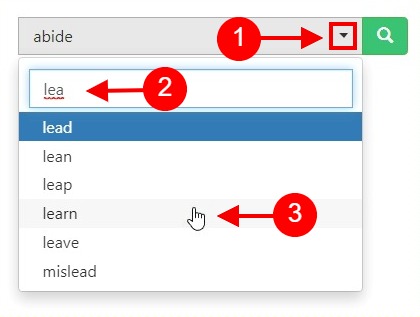
regular verbs & Irregular verbs
Here are the past tense forms of the verb travel
👉 Forms of verb travel in future and past simple and past participle. ❓ What is the past tense of travel.
Travel: Past, Present, and Participle Forms
What are the 2nd and 3rd forms of the verb travel.
🎓 What are the past simple, future simple, present perfect, past perfect, and future perfect forms of the base form (infinitive) ' travel '? 👉 It's quite simple -->
Learn the three forms of the English verb 'travel'
- the first form (V1) is 'travel' used in present simple and future simple tenses.
- the second form (V2) is 'travelled (BrE)', 'traveled (AmE)' used in past simple tense.
- the third form (V3) is 'travelled (BrE)', 'traveled (AmE)' used in present perfect and past perfect tenses.
What are the past tense and past participle of travel?
What is the past tense of travel.
The past tense of the verb "travel" is "travelled (BrE)", or "traveled (AmE)", and the past participle is "travelled (BrE)" or "traveled (AmE)".
Verb Tenses
Past simple — travel in past simple travelled (BrE), traveled (AmE) (V2) . Future simple — travel in future simple is travel (will + V1) . Present Perfect — travel in present perfect tense is travelled (BrE), traveled (AmE) (have/has + V3) . Past Perfect — travel in past perfect tense is travelled (BrE), traveled (AmE) (had + V3) .
travel regular or irregular verb?
👉 Is 'travel' a regular or irregular verb? The verb 'travel' is regular verb .
Examples of Verb travel in Sentences
- These days we travelled 1400 km (Past Simple)
- We didn't travel that long (Past Simple)
- She has travelled extensively in the Philippines (Present Perfect)
- I can't travel without you (Present Simple)
- We usually travel to work by bus (Present Simple)
- A plane travels faster than a train (Present Simple)
- They are travelling together since 2018 (Present Continuous)
- You can travel by foot, why not? (Present Simple)
- Unfortunately you can't travel without a ticket, so please proceed to the ticket office (Present Simple)
- How many countries have you travelled to? (Present Perfect)
Along with travel, words are popular tell and throw .
Verbs by letter: r , d , u , c , m , p , b , w , h , a , e , g , s , q , j , l , t , f , o , n , k , i , v , y , z .
English verbs
- 318 Irregular verbs
- 904 Regular verbs
- 5 Modal verbs
- 407 Phrasal verb
Online verb dictionary
We are currently working to add new verbs and examples to our website, along with detailed descriptions. Please send us a message if you have any requests or suggestions, and we will add them as quickly as we can. Thank you for your interest in our website!
our editor - Peter (Certified TEFL Tutor with over 8 years experience)
Have a question or find mistake?
- Cambridge Dictionary +Plus
- +Plus ayuda
- Cerrar sesión
Table of irregular verbs
Note that be has several irregular forms:
Present: ( I ) am , ( she, he, it ) is , ( you , we , they ) are
Past: ( I, she, he, it ) was , ( you , we , they ) were
-ed form: been

Palabra del día
cloak-and-dagger
Your browser doesn't support HTML5 audio
used to describe an exciting story involving secrets and mystery, often about spies, or something that makes you think of this

Shoots, blooms and blossom: talking about plants

Palabras nuevas
Aprende más con +Plus
- Recientes y Recomendados {{#preferredDictionaries}} {{name}} {{/preferredDictionaries}}
- Definiciones Explicaciones claras del uso natural del inglés escrito y oral inglés Learner’s Dictionary inglés británico esencial inglés americano esencial
- Gramática y sinónimos Explicaciones del uso natural del inglés escrito y oral gramática sinónimos y antónimos
- Pronunciation British and American pronunciations with audio English Pronunciation
- inglés-chino (simplificado) Chinese (Simplified)–English
- inglés-chino (tradicional) Chinese (Traditional)–English
- inglés–holandés holandés-inglés
- inglés-francés francés-inglés
- inglés-alemán alemán-inglés
- inglés-indonesio indonesio-inglés
- inglés-italiano italiano-inglés
- inglés-japonés japonés-inglés
- inglés-noruego noruego–inglés
- inglés-polaco polaco-inglés
- inglés-portugués portugués-inglés
- inglés-español español-inglés
- English–Swedish Swedish–English
- Dictionary +Plus Listas de palabras
Añadir ${headword} a una de tus listas, o crear una lista nueva.
{{message}}
Ha ocurrido un error
El informe no pudo enviarse.
- Articles >
The Moscow Metro Museum of Art: 10 Must-See Stations
There are few times one can claim having been on the subway all afternoon and loving it, but the Moscow Metro provides just that opportunity. While many cities boast famous public transport systems—New York’s subway, London’s underground, San Salvador’s chicken buses—few warrant hours of exploration. Moscow is different: Take one ride on the Metro, and you’ll find out that this network of railways can be so much more than point A to B drudgery.
The Metro began operating in 1935 with just thirteen stations, covering less than seven miles, but it has since grown into the world’s third busiest transit system ( Tokyo is first ), spanning about 200 miles and offering over 180 stops along the way. The construction of the Metro began under Joseph Stalin’s command, and being one of the USSR’s most ambitious building projects, the iron-fisted leader instructed designers to create a place full of svet (radiance) and svetloe budushchee (a radiant future), a palace for the people and a tribute to the Mother nation.
Consequently, the Metro is among the most memorable attractions in Moscow. The stations provide a unique collection of public art, comparable to anything the city’s galleries have to offer and providing a sense of the Soviet era, which is absent from the State National History Museum. Even better, touring the Metro delivers palpable, experiential moments, which many of us don’t get standing in front of painting or a case of coins.
Though tours are available , discovering the Moscow Metro on your own provides a much more comprehensive, truer experience, something much less sterile than following a guide. What better place is there to see the “real” Moscow than on mass transit: A few hours will expose you to characters and caricatures you’ll be hard-pressed to find dining near the Bolshoi Theater. You become part of the attraction, hear it in the screech of the train, feel it as hurried commuters brush by: The Metro sucks you beneath the city and churns you into the mix.
With the recommendations of our born-and-bred Muscovite students, my wife Emma and I have just taken a self-guided tour of what some locals consider the top ten stations of the Moscow Metro. What most satisfied me about our Metro tour was the sense of adventure . I loved following our route on the maps of the wagon walls as we circled the city, plotting out the course to the subsequent stops; having the weird sensation of being underground for nearly four hours; and discovering the next cavern of treasures, playing Indiana Jones for the afternoon, piecing together fragments of Russia’s mysterious history. It’s the ultimate interactive museum.
Top Ten Stations (In order of appearance)
Kievskaya station.
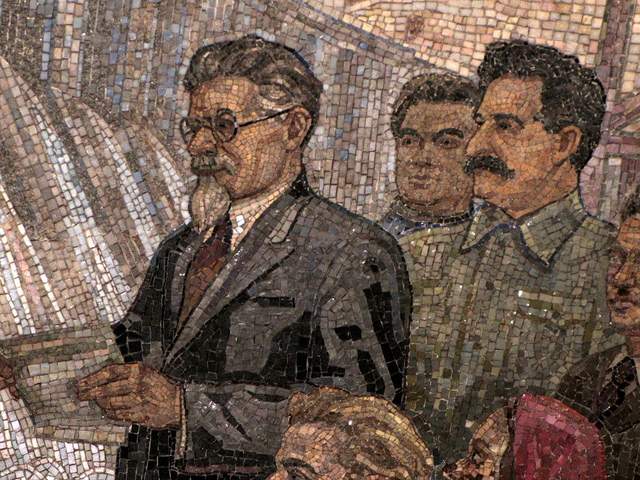
Kievskaya Station went public in March of 1937, the rails between it and Park Kultury Station being the first to cross the Moscow River. Kievskaya is full of mosaics depicting aristocratic scenes of Russian life, with great cameo appearances by Lenin, Trotsky, and Stalin. Each work has a Cyrillic title/explanation etched in the marble beneath it; however, if your Russian is rusty, you can just appreciate seeing familiar revolutionary dates like 1905 ( the Russian Revolution ) and 1917 ( the October Revolution ).
Mayakovskaya Station
Mayakovskaya Station ranks in my top three most notable Metro stations. Mayakovskaya just feels right, done Art Deco but no sense of gaudiness or pretention. The arches are adorned with rounded chrome piping and create feeling of being in a jukebox, but the roof’s expansive mosaics of the sky are the real showstopper. Subjects cleverly range from looking up at a high jumper, workers atop a building, spires of Orthodox cathedrals, to nimble aircraft humming by, a fleet of prop planes spelling out CCCP in the bluest of skies.
Novoslobodskaya Station

Novoslobodskaya is the Metro’s unique stained glass station. Each column has its own distinctive panels of colorful glass, most of them with a floral theme, some of them capturing the odd sailor, musician, artist, gardener, or stenographer in action. The glass is framed in Art Deco metalwork, and there is the lovely aspect of discovering panels in the less frequented haunches of the hall (on the trackside, between the incoming staircases). Novosblod is, I’ve been told, the favorite amongst out-of-town visitors.
Komsomolskaya Station
Komsomolskaya Station is one of palatial grandeur. It seems both magnificent and obligatory, like the presidential palace of a colonial city. The yellow ceiling has leafy, white concrete garland and a series of golden military mosaics accenting the tile mosaics of glorified Russian life. Switching lines here, the hallway has an Alice-in-Wonderland feel, impossibly long with decorative tile walls, culminating in a very old station left in a remarkable state of disrepair, offering a really tangible glimpse behind the palace walls.
Dostoevskaya Station

Dostoevskaya is a tribute to the late, great hero of Russian literature . The station at first glance seems bare and unimpressive, a stark marble platform without a whiff of reassembled chips of tile. However, two columns have eerie stone inlay collages of scenes from Dostoevsky’s work, including The Idiot , The Brothers Karamazov , and Crime and Punishment. Then, standing at the center of the platform, the marble creates a kaleidoscope of reflections. At the entrance, there is a large, inlay portrait of the author.
Chkalovskaya Station
Chkalovskaya does space Art Deco style (yet again). Chrome borders all. Passageways with curvy overhangs create the illusion of walking through the belly of a chic, new-age spacecraft. There are two (kos)mosaics, one at each end, with planetary subjects. Transferring here brings you above ground, where some rather elaborate metalwork is on display. By name similarity only, I’d expected Komsolskaya Station to deliver some kosmonaut décor; instead, it was Chkalovskaya that took us up to the space station.
Elektrozavodskaya Station
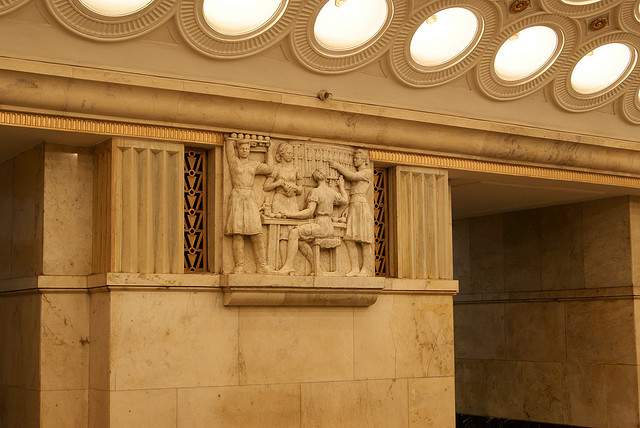
Elektrozavodskaya is full of marble reliefs of workers, men and women, laboring through the different stages of industry. The superhuman figures are round with muscles, Hollywood fit, and seemingly undeterred by each Herculean task they respectively perform. The station is chocked with brass, from hammer and sickle light fixtures to beautiful, angular framework up the innards of the columns. The station’s art pieces are less clever or extravagant than others, but identifying the different stages of industry is entertaining.
Baumanskaya Statio
Baumanskaya Station is the only stop that wasn’t suggested by the students. Pulling in, the network of statues was just too enticing: Out of half-circle depressions in the platform’s columns, the USSR’s proud and powerful labor force again flaunts its success. Pilots, blacksmiths, politicians, and artists have all congregated, posing amongst more Art Deco framing. At the far end, a massive Soviet flag dons the face of Lenin and banners for ’05, ’17, and ‘45. Standing in front of the flag, you can play with the echoing roof.

Ploshchad Revolutsii Station
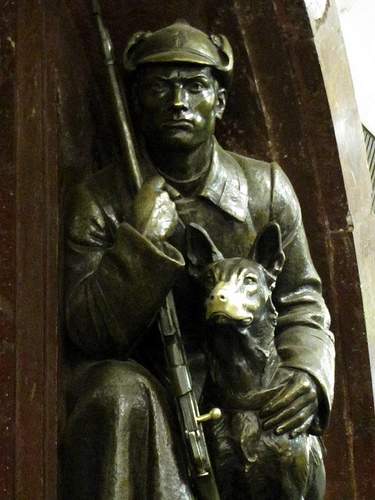
Novokuznetskaya Station
Novokuznetskaya Station finishes off this tour, more or less, where it started: beautiful mosaics. This station recalls the skyward-facing pieces from Mayakovskaya (Station #2), only with a little larger pictures in a more cramped, very trafficked area. Due to a line of street lamps in the center of the platform, it has the atmosphere of a bustling market. The more inventive sky scenes include a man on a ladder, women picking fruit, and a tank-dozer being craned in. The station’s also has a handsome black-and-white stone mural.
Here is a map and a brief description of our route:
Start at (1)Kievskaya on the “ring line” (look for the squares at the bottom of the platform signs to help you navigate—the ring line is #5, brown line) and go north to Belorusskaya, make a quick switch to the Dark Green/#2 line, and go south one stop to (2)Mayakovskaya. Backtrack to the ring line—Brown/#5—and continue north, getting off at (3)Novosblodskaya and (4)Komsolskaya. At Komsolskaya Station, transfer to the Red/#1 line, go south for two stops to Chistye Prudy, and get on the Light Green/#10 line going north. Take a look at (5)Dostoevskaya Station on the northern segment of Light Green/#10 line then change directions and head south to (6)Chkalovskaya, which offers a transfer to the Dark Blue/#3 line, going west, away from the city center. Have a look (7)Elektroskaya Station before backtracking into the center of Moscow, stopping off at (8)Baumskaya, getting off the Dark Blue/#3 line at (9)Ploschad Revolyutsii. Change to the Dark Green/#2 line and go south one stop to see (10)Novokuznetskaya Station.
Check out our new Moscow Indie Travel Guide , book a flight to Moscow and read 10 Bars with Views Worth Blowing the Budget For
Jonathon Engels, formerly a patron saint of misadventure, has been stumbling his way across cultural borders since 2005 and is currently volunteering in the mountains outside of Antigua, Guatemala. For more of his work, visit his website and blog .

Photo credits: SergeyRod , all others courtesy of the author and may not be used without permission

- Mode Terang
- Gabung Kompas.com+
- Konten yang disimpan
- Konten yang disukai
- Berikan Masukanmu

- Megapolitan
- Surat Pembaca
- Kilas Daerah
- Kilas Korporasi
- Kilas Kementerian
- Sorot Politik
- Kilas Badan Negara
- Kelana Indonesia
- Kalbe Health Corner
- Kilas Parlemen
- Konsultasi Hukum
- Infrastructure
- Apps & OS
- Tech Innovation
- Kilas Internet
- Elektrifikasi
- Timnas Indonesia
- Liga Indonesia
- Liga Italia
- Liga Champions
- Liga Inggris
- Liga Spanyol
- Internasional
- Sadar Stunting
- Spend Smart
- Smartpreneur
- Kilas Badan
- Kilas Transportasi
- Kilas Fintech
- Kilas Perbankan
- Tanya Pajak
- Sorot Properti
- Tips Kuliner
- Tempat Makan
- Panduan Kuliner Yogyakarta
- Beranda UMKM
- Jagoan Lokal
- Perguruan Tinggi
- Pendidikan Khusus
- Kilas Pendidikan
- Jalan Jalan
- Travel Tips
- Hotel Story
- Travel Update
- Nawa Cahaya
- Ohayo Jepang
- Kehidupan sehat dan sejahtera
- Air bersih dan sanitasi layak
- Pendidikan Berkualitas
- Energi Bersih dan Terjangkau
- Penanganan Perubahan Iklim
- Ekosistem Lautan
- Ekosistem Daratan
- Tanpa Kemiskinan
- Tanpa Kelaparan
- Kesetaraan Gender
- Pekerjaan Layak dan Pertumbuhan ekonomi
- Industri, Inovasi & Infrastruktur
- Berkurangnya Kesenjangan
- Kota & Pemukiman yang Berkelanjutan
- Konsumsi & Produksi yang bertanggungjawab

70 Regular Verbs beserta Artinya
Kompas.com skola, astrid riyani atmaja,, silmi nurul utami.
Tim Redaksi
Astrid Riyani Atmaja
Penulis silmi nurul utami, tag materi bahasa inggris kelas 6 regular verb adalah regular verb contoh regular verb bentuk regular verb pengertian regular verb regular verb example regular verb dan artinya.

Contoh Kalimat Simple Present Tense dan Simple Past Tense

4 Perbedaan Regular dan Irregular Verb
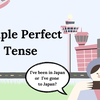
Simple Perfect Tense: Pengertian, Rumus, dan Contoh Kalimat
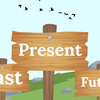
Perbedaan Past, Present, dan Future dalam Tenses
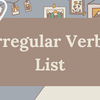
70 Irregular Verbs beserta Artinya

TTS Eps 137: Yuk Lebaran

TTS Eps 136: Takjil Khas di Indonesia

TTS Eps 135: Serba Serbi Ramadhan

Games Permainan Kata Bahasa Indonesia

TTS - Serba serbi Demokrasi
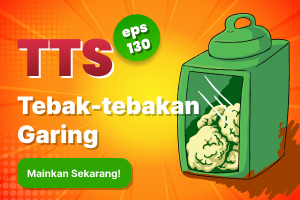
TTS Eps 130 - Tebak-tebakan Garing

TTS - Musik Yang Paling Mengguncang
Berita terkait.
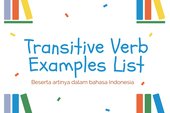
Terkini Lainnya

Makna Tembang Dolanan "Jamuran"
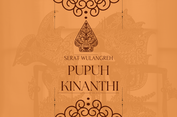
Serat Wulangreh Pupuh Kinanthi
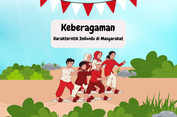
Manfaat Keberagaman Karakteristik Individu di Masyarakat

Mahkamah Konstitusi: Peran, Kewajiban, dan Wewenang
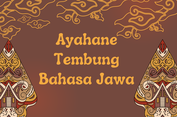
Ayahane Tembung Bahasa Jawa
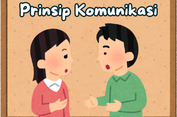
4 Prinsip Komunikasi beserta Penjelasannya
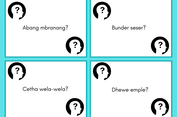
Tembung Ngemu Teges Mbangetake Bahasa Jawa
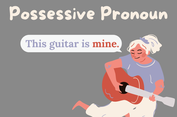
Possessive Pronoun: Kata Ganti Kepemilikan dalam Bahasa Inggris
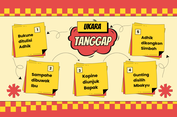
Contoh Ukara Tanduk Bahasa Jawa

5 Satelit Terbesar Planet Uranus

Apa Perbedaan Seni Murni dan Seni Terapan? Ini Penjelasannya ....
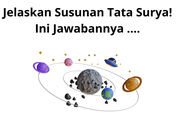
Jelaskan Susunan Tata Surya! Ini Jawabannya ....

Jawaban dari Soal "Ekstensi dari File Microsoft Excel"
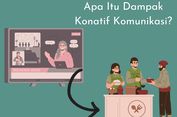
Apa Itu Dampak Konatif Komunikasi?
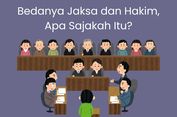
Bedanya Jaksa dan Hakim, Apa Sajakah Itu?
Reaksi puan saat ditanya tentang jokowi yang disebut hasto ingin ambil alih kursi ketum pdi-p, saksi ahli prabowo-gibran: kalau bansos berpengaruh, anies tidak bisa menang lawan ahok, pimpinan komisi ii sebut pkpu soal syarat usia cawapres sudah dikonsultasikan ke dpr, viral, unggahan biaya servis di bengkel sukabumi ditagih rp 2,2 juta, serangan balik yusril ke magnis suseno, sebut bicara omong kosong, now trending.

Sidang MK, Anggota DPR Akui Incar Insentif Elektoral dari Program Bansos

Sidang Isbat Penetapan Hari Raya Idul Fitri 2024 Digelar 9 April

Luhut: Kasus Timah Jadi Pembelajaran buat Kita Semua

Bansos Beras Lanjut Setelah Juni? Jokowi: Saya Tidak Janji
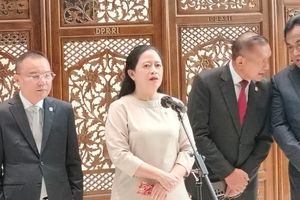
Mungkin Anda melewatkan ini

Kisah Sunan Gunung Jati dalam Menyebarkan Agama Islam di Jawa

Mengenal Neptunus, Si Planet Biru

Apa Itu Ukara Tanduk dalam Bahasa Jawa?

Mengenal Tembung Andhahan Bahasa Jawa

Tembung Lingga Bahasa Jawa
- Entertainment
- Pesona Indonesia
- Artikel Terpopuler
- Artikel Terkini
- Topik Pilihan
- Artikel Headline
- Harian KOMPAS
- Kompasiana.com
- Pasangiklan.com
- Gramedia.com
- Gramedia Digital
- Gridoto.com
- Bolasport.com
- Kontan.co.id
- Kabar Palmerah
- Kebijakan Data Pribadi
- Pedoman Media Siber
Copyright 2008 - 2023 PT. Kompas Cyber Media (Kompas Gramedia Digital Group). All Rights Reserved.

Moscow Metro Font

Moscow Metro is a multi-line display typeface inspired by the Moscow underground map. It comes in Regular and Color versions.
Moscow Metro is ideal for posters and headlines, neon signage and other artworks.
- Share by email
Designed by: Nadira Filatova Website
License: free for commercial use.


Enter No account yet? Register Forgot your password?

Register Already have an account? Enter
Recover your password Already have an account? Enter No account yet? Register
Regular verbs
Choose category Choose Featured A B C D E F G H I J K L M N O P R S T U V W to travel Conjugate Infinitive travel Past simple traveled (US) travelled (UK) Past participle traveled (US) travelled (UK) Gerund traveling (US) travelling (UK) Conjugation of verb "To travel" Present Simple Affirmative I travel. You travel. We travel. He/She/It travels. You travel. They travel. Negative I do not travel. You do not travel. We do not travel. He/She/It does not travel. You do not travel. They do not travel. Interrogative Do I travel? Do you travel? Do we travel? Does he/she/it travel? Do you travel? Do they travel? Go to the related lesson Present Simple Continuous Affirmative I am traveling. You are traveling. We are traveling. He/She/It is traveling. You are traveling. They are traveling. Negative I am not traveling. You are not traveling. We are not traveling. He/She/It is not traveling. You are not traveling. They are not traveling. Interrogative Am I traveling? Are you traveling? Are we traveling? Is he/she/it traveling? Are you traveling? Are they traveling? Go to the related lesson Past Simple Affirmative I traveled. You traveled. We traveled. He/She/It traveled. You traveled. They traveled. Negative I did not travel. You did not travel. We did not travel. He/She/It did not travel. You did not travel. They did not travel. Interrogative Did I travel? Did you travel? Did we travel? Did he/she/it travel? Did you travel? Did they travel? Go to the related lesson Past Continuous Affirmative I was traveling. You were traveling. We were traveling. He/She/It was traveling. You were traveling. They were traveling. Negative I was not traveling. You were not traveling. We were not traveling. He/She/It was not traveling. You were not traveling. They were not traveling. Interrogative Was I traveling? Were you traveling? Were we traveling? Was he/she/it traveling? Were you traveling? Were they traveling? Go to the related lesson Future Simple Affirmative I will travel. You will travel. We will travel. He/She/It will travel. You will travel. They will travel. Negative I will not travel. You will not travel. We will not travel. He/She/It will not travel. You will not travel. They will not travel. Interrogative Will I travel? Will you travel? Will we travel? Will he/she/it travel? Will you travel? Will they travel? Go to the related lesson Present Perfect Simple Affirmative I have traveled. You have traveled. We have traveled. He/She/It has traveled. You have traveled. They have traveled. Negative I have not traveled. You have not traveled. We have not traveled. He/She/It has not traveled. You have not traveled. They have not traveled. Interrogative Have I traveled? Have you traveled? Have we traveled? Has he/she/it traveled? Have you traveled? Have they traveled? Go to the related lesson Present Perfect Continuous Affirmative I have been traveling. You have been traveling. We have been traveling. He/She/It has been traveling. You have been traveling. They have been traveling. Negative I have not been traveling. You have not been traveling. We have not been traveling. He/She/It has not been traveling. You have not been traveling. They have not been traveling. Interrogative Have I been traveling? Have you been traveling? Have we been traveling? Has he/she/it been traveling? Have you been traveling? Have they been traveling? Go to the related lesson Past Perfect Simple Affirmative I had traveled. You had traveled. We had traveled. He/She/It had traveled. You had traveled. They had traveled. Negative I had not traveled. You had not traveled. We had not traveled. He/She/It had not traveled. You had not traveled. They had not traveled. Interrogative Had I traveled? Had you traveled? Had we traveled? Had he/she/it traveled? Had you traveled? Had they traveled? Go to the related lesson Past Perfect Continuous Affirmative I had been traveling. You had been traveling. We had been traveling. He/She/It had been traveling. You had been traveling. They had been traveling. Negative I had not been traveling. You had not been traveling. We had not been traveling. He/She/It had not been traveling. You had not been traveling. They had not been traveling. Interrogative Had I been traveling? Had you been traveling? Had we been traveling? Had he/she/it been traveling? Had you been traveling? Had they been traveling? Go to the related lesson Future Perfect Affirmative I will have traveled. You will have traveled. We will have traveled. He/She/It will have traveled. You will have traveled. They will have traveled. Negative I will not have traveled. You will not have traveled. We will not have traveled. He/She/It will not have traveled. You will not have traveled. They will not have traveled. Interrogative Will I have traveled? Will you have traveled? Will we have traveled? Will he/she/it have traveled? Will you have traveled? Will they have traveled? Go to the related lesson Conditional Affirmative I would travel. You would travel. We would travel. He/She/It would travel. You would travel. They would travel. Negative I would not travel. You would not travel. We would not travel. He/She/It would not travel. You would not travel. They would not travel. Interrogative Would I travel? Would you travel? Would we travel? Would he/she/it travel? Would you travel? Would they travel? Go to the related lesson Conditional Perfect Affirmative I would have traveled. You would have traveled. We would have traveled. He/She/It would have traveled. You would have traveled. They would have traveled. Negative I would not have traveled. You would not have traveled. We would not have traveled. He/She/It would not have traveled. You would not have traveled. They would not have traveled. Interrogative Would I have traveled? Would you have traveled? Would we have traveled? Would he/she/it have traveled? Would you have traveled? Would they have traveled? Go to the related lesson

IMAGES
VIDEO
COMMENTS
Conjugate the English verb travel: indicative, past tense, participle, present perfect, gerund, conjugation models and irregular verbs. Translate travel in context, with examples of use and definition.
Table of irregular verbs - English Grammar Today - a reference to written and spoken English grammar and usage - Cambridge Dictionary
English verb TO TRAVEL conjugated in all forms, with full audio, irregular highlighting, negative forms and contractions.
travel. 'travel' is the model of its conjugation. In British English, the final consonant is doubled before -ing and -ed. infinitive: present participle: past participle: (to) travel. trave ll ing. trave ll ed.
The correct answer would be "went.". Matching: In this exercise, you will be given a list of past tense verbs and a list of travel-related words. Your task is to match the past tense verb with the correct travel-related word. For example, "flew" would match with "airplane.". Written Exercises.
Conjugation English verb to travel in several modes, tenses, voices, numbers, persons : indicative mode, subjunctive, imperative mood, conditional, participle form, gerund, present, past, future perfect, progressive. ... Menu. Other languages available English French Italian Spanish Portuguese German. English Irregular Verbs. Contact ...
Present Continuous. I am travelling or traveling you are travelling or traveling he/she/it is travelling or traveling we are travelling or traveling you are travelling or traveling they are travelling or traveling.
Conjugation of verb "To travel". Present Simple. Affirmative. I travel. You travel. We travel. He/She/It travels. You travel. They travel.
Conjugation of the verb Travel in all tenses: future, present and past. 🎮 Conjugation trainer for memorizing forms.
Conjugate the verb travel in all tenses: present, past, participle, present perfect, gerund, etc.
Irregular Verbs. Englishpage.com's List of English Irregular Verbs contains over 370 irregular verbs used in modern English. We also offer free irregular verb flashcards and exercises, a printable PDF of the Top 100 Irregular Verbs, and an extended list including rare verb forms.Just scroll down to begin!
The past forms for irregular verbs are not regular -- you just have to learn them. Sometimes people study these verbs in groups based on the past simple form -- for example, 'buy', 'bring' and 'think' all have '-ought' in their past simple form: 'bought', 'brought' and 'thought'. All the best, Kirk The LearnEnglish Team
If you're having difficulty with the English verb to travel, check out our online English lessons!Vatefaireconjuguer is a free online conjugator created by Gymglish. Founded in 2004, Gymglish creates fun, personalized online language courses: English course, Spanish course, German course, French course, Italian course and more. Conjugate all English verbs (of all groups) in every tense and ...
Conjugation is the creation of derived forms of a verb from its principal parts by inflection (alteration of form according to rules of grammar). For instance, the verb "break" can be conjugated to form the words break, breaks, broke, broken and breaking. The term conjugation is applied only to the inflection of verbs, and not of other parts of speech (inflection of nouns and adjectives is ...
Learn the three forms of the English verb 'travel'. the first form (V1) is 'travel' used in present simple and future simple tenses. the second form (V2) is 'travelled (BrE)', 'traveled (AmE)' used in past simple tense. the third form (V3) is 'travelled (BrE)', 'traveled (AmE)' used in present perfect and past perfect tenses.
Table of irregular verbs - gramática inglés y uso de palabras en "English Grammar Today" - Cambridge University Press
Some irregular present tense verbs only change in the 'I' form. Radical-changing verbs take the same endings as regular verbs but the. stem. close. stem The part of the verb that is left once ...
Have a look (7)Elektroskaya Station before backtracking into the center of Moscow, stopping off at (8)Baumskaya, getting off the Dark Blue/#3 line at (9)Ploschad Revolyutsii. Change to the Dark Green/#2 line and go south one stop to see (10)Novokuznetskaya Station. Check out our new Moscow Indie Travel Guide, book a flight to Moscow and read 10 ...
Berikut 70 contoh regular verb beserta artinya! Baca juga: Perbedaan Past, Present, dan Future dalam Tenses. Accept - accepted - accepted (menerima) Achieve - achieved - achieved (meraih) Add - added - added (menambahkan) Allow - allowed - allowed (mengizinkan) Announce - announced - announced (mengumumkan)
Rome2Rio makes travelling from Elektrostal to Moscow Sheremetyevo Airport (SVO) easy. Rome2Rio is a door-to-door travel information and booking engine, helping you get to and from any location in the world. Find all the transport options for your trip from Elektrostal to Moscow Sheremetyevo Airport (SVO) right here.
Rome2Rio is a door-to-door travel information and booking engine, helping you get to and from any location in the world. Find all the transport options for your trip from Elektrostal to Moscow right here. Rome2Rio displays up to date schedules, route maps, journey times and estimated fares from relevant transport operators, ensuring you can ...
License: Free for commercial use. July 14, 2020 featured in Display. Download Moscow Metro font, a multi-line display typeface in two styles, inspired by the Moscow underground map. Moscow Metro is ideal for posters and headlines, neon signage and other artworks.
travel: Here you can find information the English regular verb. Learn. My first time First steps Level ... Learn First steps Level test Basic level Intermediate level Advanced level Full course Regular verbs Irregular verbs Phrasal verbs Practice Grammar exercises Video lessons Songs Games Resources Expressions Sayings Quotes Translator ...